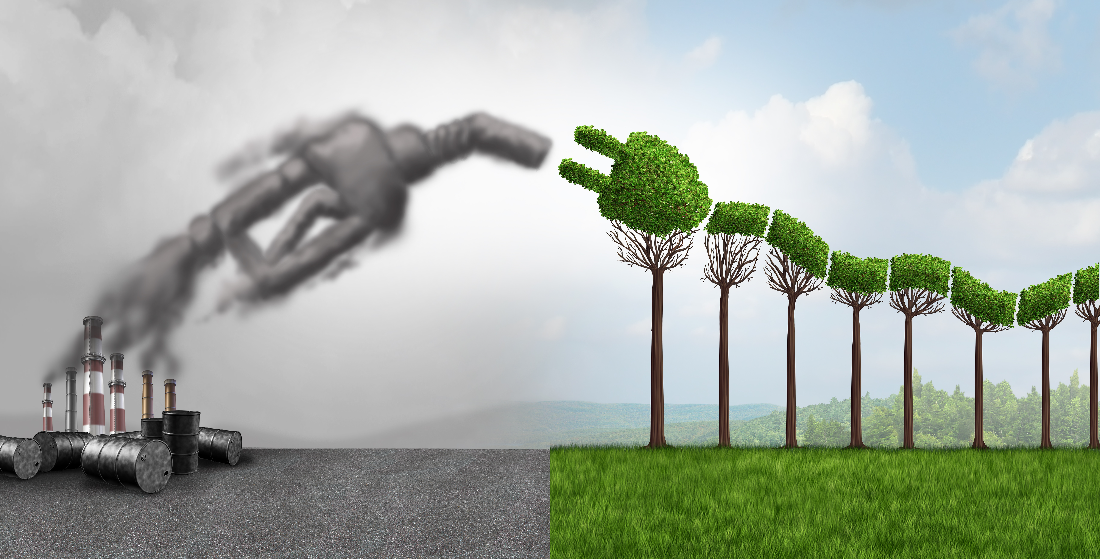Not charged up and plenty of places to go!
Crude oil producers got a sharp wake-up call with the recent Dutch court ruling against Shell. In a fast changing world many of the big oil producers need a wake up to the full reality of reducing emissions. At the same time some realism needs to remain during such transitionary periods.

Apart from riding my bicycle, my favourite form of A to B travel has to be on the train – and of course in the UK the majority of these are electric, with some diesel freight locos also still in operation. Rail travel gives me the luxury of being able to work, relax, think/dream and sleep (not necessarily in that order mind you) while getting from A to B without any stress or hassle. But – probably like many of you - my most frequent form of transport is the motor car/automobile. And, unless you have the luxury of an electric vehicle (EV) that still means the use of petrol/gasoline and oil. Shock, horror!
With the increased push on the global phase-out of fossil fuels – the dirty world of crude oil has become even dirtier. The motor vehicle industry is wrapped in the huge transitional process to electrification. Now, how many of you have an electric vehicle? Not a big percentage I will bet! How many of you would like to have an electric vehicle? Quite a lot I would say! I certainly would!
But the transition phase is just that – a transition, and in certain sectors it will take longer than others. Coal has been battered in recent years (even though some 40% of power globally is still generated by thermal coal) and now most financial institutions won’t directly touch it. Oil – particularly upstream – is under increasing pressure (see below). And other ‘cleaner’ fossil fuels such as natural gas/LNG are also wrapped into the debate as the pressure is turned up.
However, the Paris Agreement on Climate is very clear not only on the goal of zero carbon emissions by 2050, but also in its framing of a significant transition period as part of that. The end goal is of course a long way off. It does not prevent pressure groups, environmentalists, institutions, corporates and governments etc trying to push the agenda faster. I believe that trying to speed up the process is good overall as it keeps us all firmly on our toes – and we really need to get there for the sake of the planet. But there has to be proper transition. And as I have said in previous blogs there also needs to be a significant degree of consideration given to low-income countries that are using or hope to use commodities such as oil/LNG to develop part of their economy.
So, probably like many of you, I want to try and do my bit somewhere along the line. I don’t live in a mega city like London – because if I did I don’t really think I would need a car as pubic transport is pretty good. If I did live in a big town then I would probably want to go electric. The UK government has declared that after 2030 there will be no new petrol, diesel or hybrid cars for sale. The problem in the UK currently is that there are very few charging points for electric vehicles overall. For a country hosting COP26 late this year, the roll out of EV charging has been nothing short of useless. In addition, at least 40% of the population live in terraced houses or high-rises with no chance of being able to charge a vehicle from their property.
About a month ago my 13-year old VW diesel Passat Estate – which has served me well for the past 12 years (as I bought it second hand) suddenly died on me. I live in a terraced house in a very small town in middle England and we are not allowed to have cables across the pavement (sidewalk) to charge EVs. The nearest public charging point is some 12 kilometers away. So, as I’m not going to be buying a new detached house with a driveway, I will be buying a ‘’new’ second hand car – which will be the cleanest (lowest emission) petrol driven estate car I can – hopefully! And hopefully petrol/gas stations will be there over the coming years to allow me to fill it.
Perhaps when I do come to changing that vehicle in some years to come, the UK will by then have invested in public charging points supplying electricity from renewables. And hopefully, affordable EVs available will have improved so that they have a better range than most current EVs. I did see a press release yesterday that the Chinese electric vehicle producer BYD had started shipping Tang all-wheel-drive SUVs to Norway which have a range of over 500km from a single charge. This is exceptional in the current EV market.
Increasing pressure on the oil/hydrocarbons sector
Oil producing companies have certainly come under increasing pressure, particularly in the last couple of years to ‘clean up their acts’. What does that mean? For some it probably means stop producing altogether – which of course isn’t going to happen, for others it means lowering carbon emissions in all processes of producing, processing and transporting crude and oil products. It also means the ultimate phasing out of new upstream production – and pressure is mounting for institutions to stop funding this segment.
At the end of May a court in the Netherlands ruled in a landmark case that by 2030 the oil major Shell must reduce its CO2 emissions by 45% compared to 2019 levels. According to Friends of the Earth this is the first time a company has been legally obliged to align its policies with the Paris climate accords. The environmental group brought the case to court in 2019, along with six other bodies and over 17,000 Dutch citizens. The decision only applies in the Netherlands, although it could have wider effects elsewhere.
In response to the decision, Shell said: “Urgent action is needed on climate change which is why we have accelerated our efforts to become a net-zero emissions energy company by 2050, in step with society, with short-term targets to track our progress.”
It also added: “We are investing billions of dollars in low-carbon energy, including electric vehicle charging, hydrogen, renewables and biofuels. We want to grow demand for these products and scale up our new energy businesses even more quickly. We will continue to focus on these efforts and fully expect to appeal today’s disappointing court decision.”
What this ruling does point to though is that people want to see oil producing companies take faster and meaningful action, rather than simply going through the motions. Some of the oil majors have done little to remove emissions from their production cycles as yet. Other producers are beginning to make changes and a few are making considerable efforts in this direction.
Commenting on these developments, Jean-Francois Lambert, founder of Lambert Commodities says: “The Shell ruling and Total changing its name into Total Energies both show that being at the helm of the largest oil companies is not an easy task. Leading these companies into the oil transition was in itself a challenge as common sense suggests that this would require several years of efforts: indeed identifying alternative sources of energy is one thing, but creating a profitable business out of them is an entirely different ball game.
“However, the meaning of ‘energy transition’ is not the same if you are an oil major on the one hand or a bank, an investor or society at large on the other hand. What will take many years should be done now. No more green washing or aspirational ideas. Banks will not finance companies much longer which are perceived as dinosaurs. Investors will not put their money into the ‘old world’ juggernauts and even more striking, young graduates will not join ‘oil’ majors much longer. Evolution will have to be swift or else…
“There is a major challenge when the reliance on oil is pervasive and will remain so for the next decades…. When Ben Van Beurden took the head of Shell in 2014, or Patrick Pouyanné was appointed to lead Total in 2015, they both were not expecting the current turn of events. Now their main task is not only to steer two highly successful companies, but to convince banks, investors and fresh graduates that they can successfully dismantle their traditional business model to accommodate the future, yet uncertain, requirements of tomorrow’s world.”
Adds Lambert: “Of course major trading houses will face the same challenge: how to make as much money trading renewables rather than oil? What does it mean for the large trading houses’ business models to embrace the energy transition? Damned if they don’t – banks will stop funnelling money, damned if they do – trading wind or becoming producers of renewables?”
Proactive responses from some
In August 2020, BP announced it will slash its oil and gas production and ramp up its renewable energy business over the next 10 years. By 2030, BP has said it will: produce 40% less oil and gas, generate 20 times more renewable energy, and invest 10 times more in low-carbon technology.
But real progress is also being made by smaller producers – and is being driven by certain industry leaders such as the Nordic independent oil and gas producer Lundin Energy which has been striving to reduce CO2 emissions in its oil production. Last year, Intertek - a Total Quality Assurance provider to industries worldwide - awarded the first CarbonClear certification in 2020 to Lundin Energy for its Edvard Grieg oilfield in the Norwegian North Sea.
Then in April this year, Intertek announced the award of the first Intertek CarbonZero certification to Lundin Energy, for the verified carbon neutral sale of 600,000 barrels of Edvard Grieg oilfield production. The sale carried the Intertek CarbonZero verified mark where full details and all traceable certifications are publicly listed for investors, traders, regulators, and other stakeholders on Intertek’s global sustainability directory. The Intertek CarbonZero mark is promoted as an independent and traceable carbon neutral certification programme for products and services.
Commenting on this significant development for the oil sector, Nick Walker, president and chief executive officer of Lundin Energy, said: “We were the first energy company to have one of its field’s carbon emissions independently certified as low carbon, and the Intertek CarbonZero certification is the next stage on our journey to carbon neutrality from 2025 from operational emissions. By certifying the carbon neutrality of this trade, Intertek CarbonZero will enable us to reach the next stage in differentiating our leading decarbonisation strategy and building a market for low and net zero carbon produced oil and gas. We look forward to continuing our partnership with Intertek, as we drive towards all oil and gas produced by Lundin Energy being carbon neutral from 2025.”
One of the benefits that Lundin has is being able to produce its product a lot cheaper than many of its competitors. That said the age of the corporate dinosaur is clearly over. Other producers and companies have to wake up to the fundamentals of responsibility for their actions and move to sustainable practices.
As Intertek has also noted: “Sustainability-conscious companies are investing in technologies, processes, and applications to drive structural and market-leading reductions in carbon emissions across their value chain. Continuing the drive towards innovative solutions allows companies to demonstrate their end-to-end commitment to carbon neutrality.”
Become a TXF subscriber for unrestricted access to TXFnews.com 365 days a year
Contact us for individual and team rates by emailing subscriptions@txfmedia.com
Take a look below at a selection of exclusive subscriber articles published last week
Development finance ‘paramount’ in fight against AMR pandemic
The world is sleepwalking into a post-antibiotic era, where simple infections become deadly. Looking to halt the march of this ‘silent pandemic’, the EIB and BioVersys have signed a financing agreement to facilitate the development of new treatments against life-threatening resistant bacterial infections....Read on here
TXF Global Commodity Finance: Top 10 trends
Last month, TXF Global Commodity Finance 2021 kicked off with a football themed opening video – passing, keepy-upping and headering its way through the top 10 industry trends of the last year. For anyone that missed it, here’s the commentary....Read on here
EKF increases writedowns in 2020
Danish export credit agency EKF upped its loan writedowns last year to DKr719 million ($117 million) from DKr630 million in 2019. According to EKF’s annual report for 2020...Read on here
Uzbekistan selects Masdar for Sherabad I solar PV
Uzbekistan's Ministry of Energy has announced that it has selected...Read on here
Contour refinances Termosolar Alvarado CSP debt
LSE-listed ContourGlobal has raised a €161.6 million ($196 million) facility to refinance the outstanding debt stapled to its...Read on here
Renewable Power Capital taps bridge loan for Finnish wind farms
Infrastructure bank Kommunalkredit Austria is expected to put up a €142.5 million ($172 million) bridge financing to...Read on here
Richard promoted within GE Renewable Energy
Marine Richard has been promoted to North & East Europe leader of GE Renewable Energy’s commercial partnering and development division....Read on here
Riordan heads up new CPRI team at Vantage
Dan Riordan, who has a strong track record of building up credit & political risk insurance (CPRI) teams at Zurich and XL Catlin, is heading up a new CPRI team at Vantage, a provider of specialty reinsurance throughout its wholly-owned subsidiaries...Read on here





